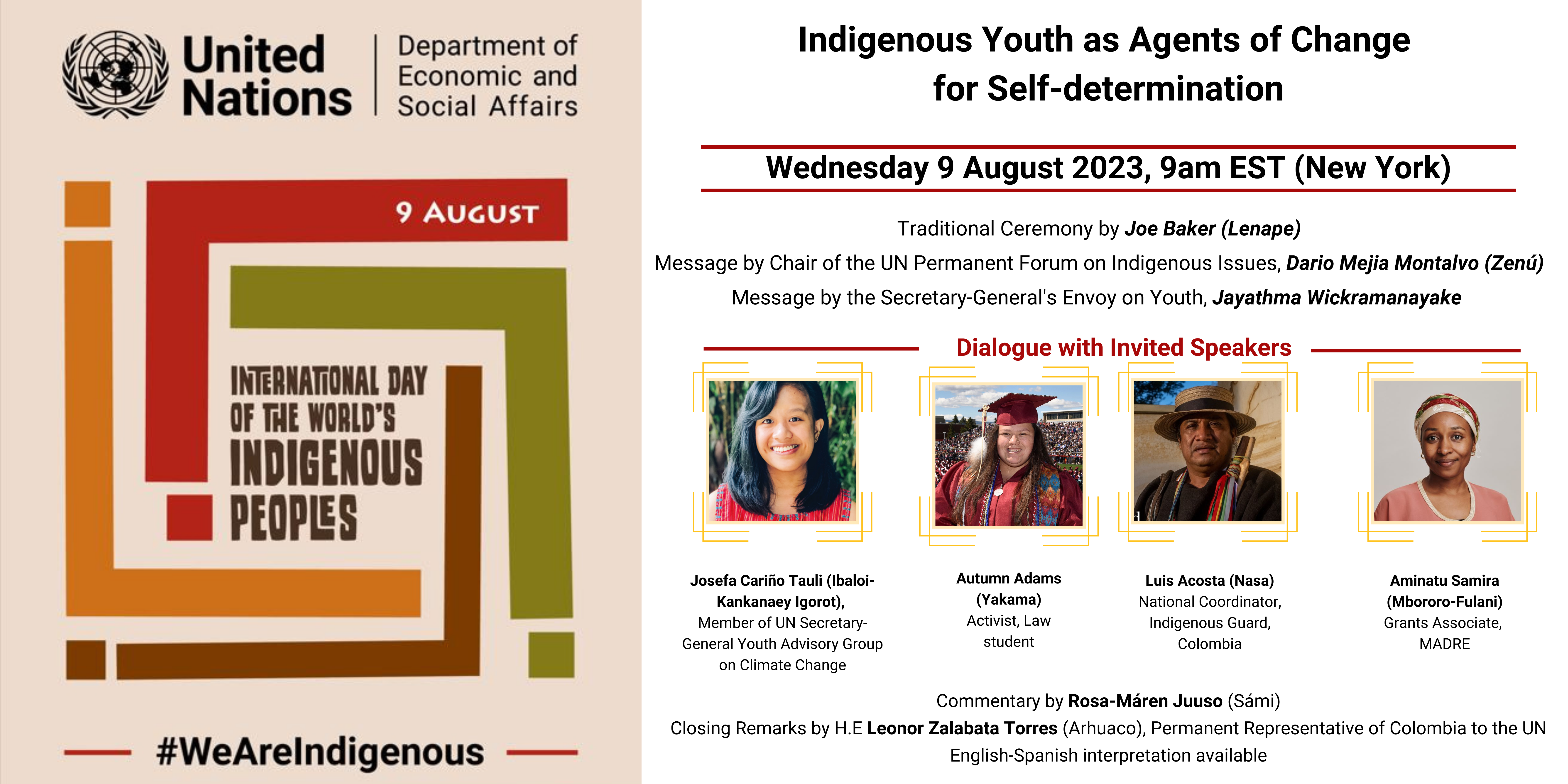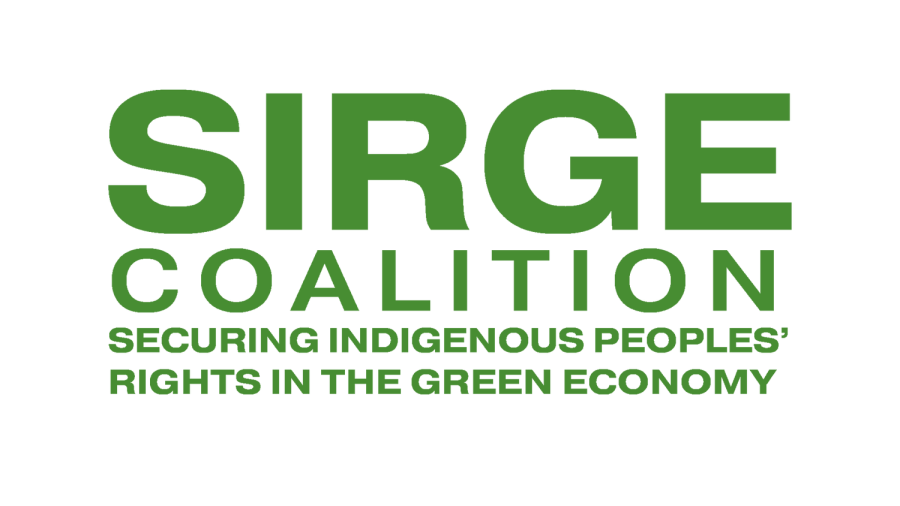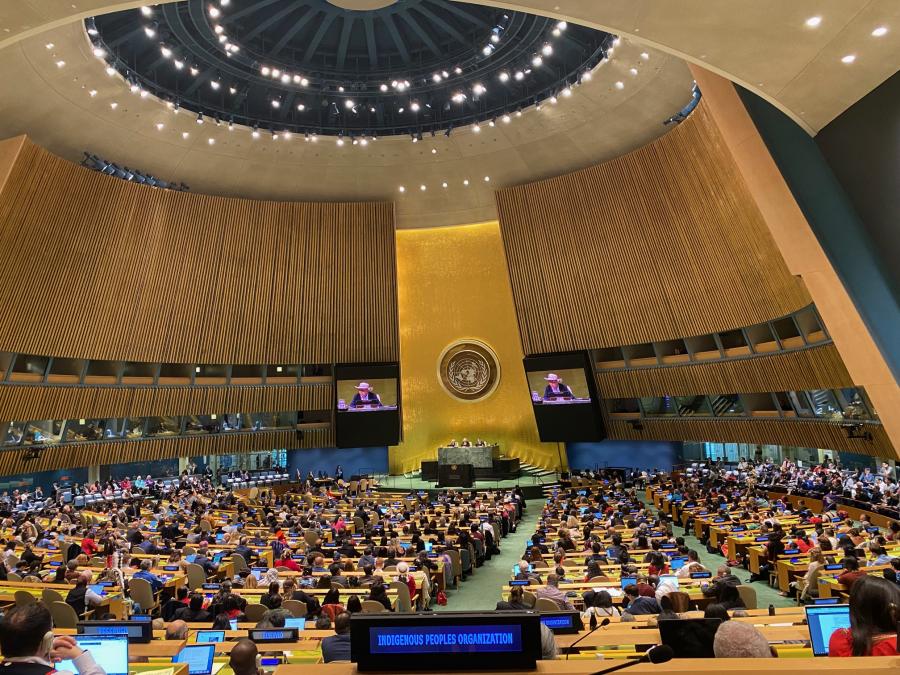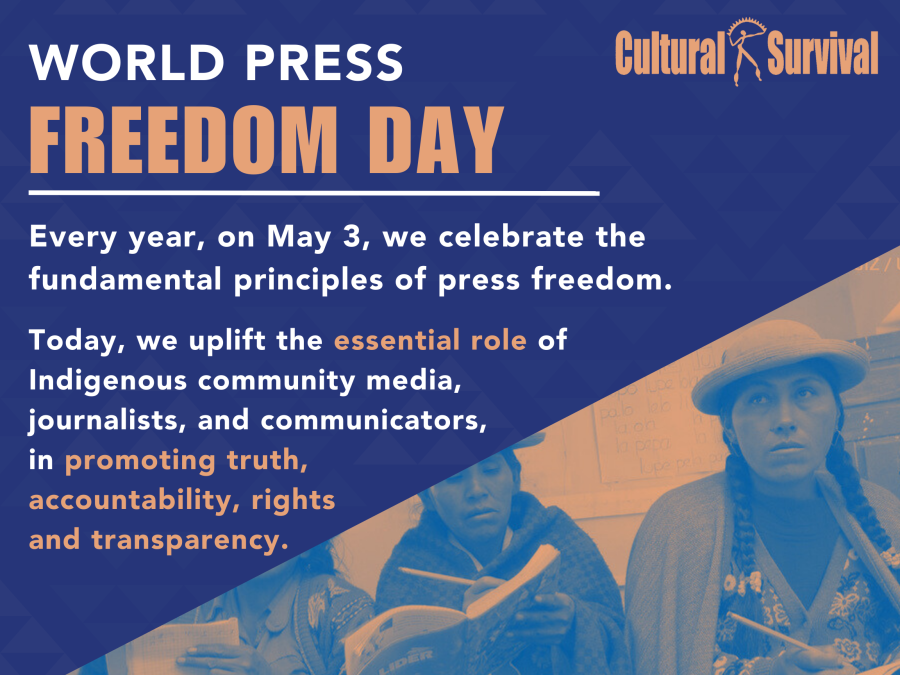
This International Day of the World's Indigenous Peoples, the SIRGE Coalition encourages you to take action in support of Indigenous communities who are facing threats from mining for transition minerals.
One year ago today, Cultural Survival, First Peoples Worldwide, Batani Foundation, Earthworks, and the Society for Threatened Peoples joined forces to launch the SIRGE Coalition dedicated to Securing Indigenous People's Rights in the Green Economy. SIRGE urges governments, corporations, and financial decision-makers to safeguard Indigenous People's rights and self-determination in the energy transition and to avoid the mistakes and harms of past resource development.
To commemorate the SIRGE Coalition anniversary and in observance of International Day of the World's Indigenous Peoples, here are actions to take, campaigns to support, and a wealth of information and stories to share highlighting the work of the SIRGE Coalition and partners around the world.
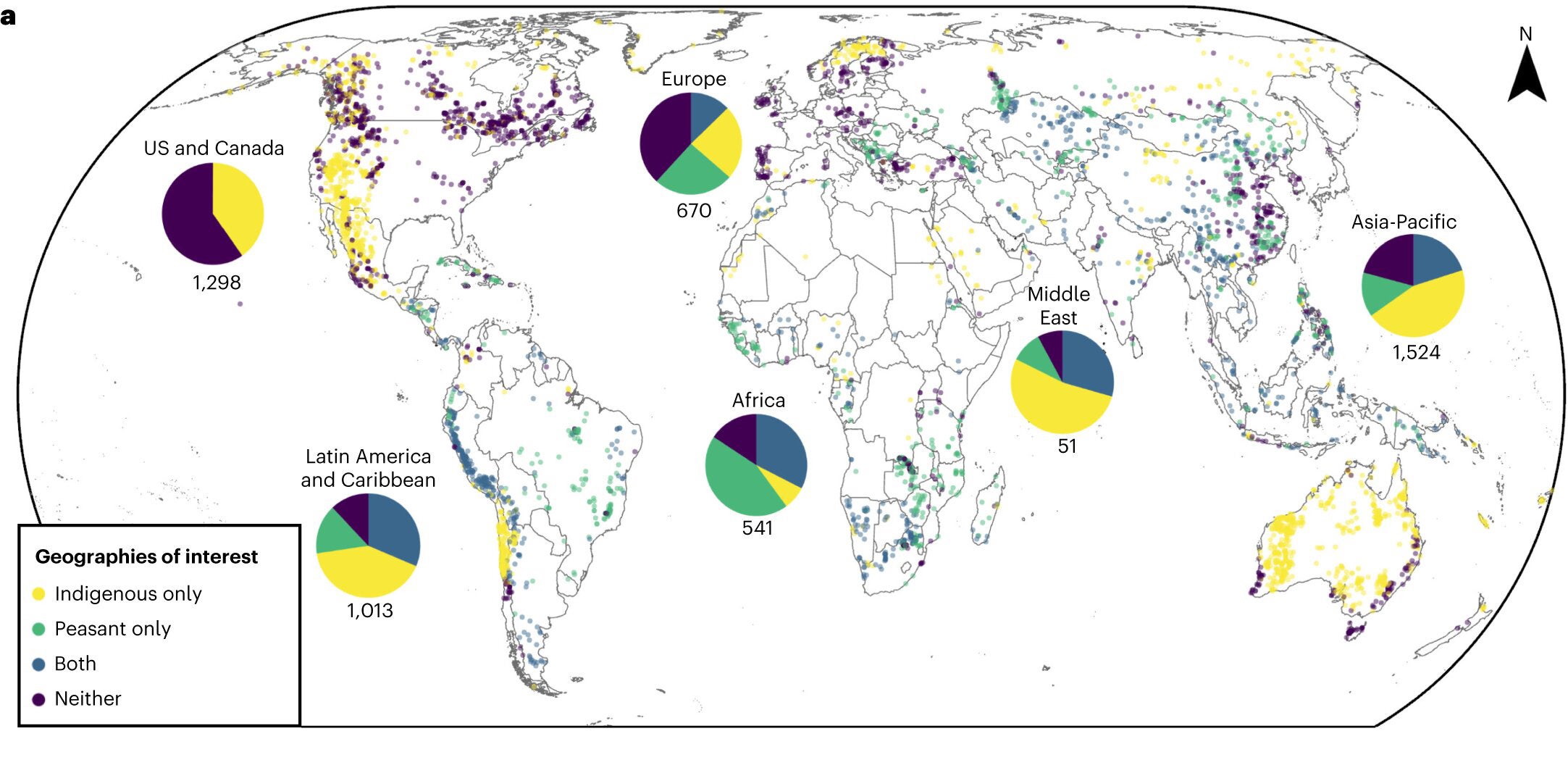
Geographic distribution of mining projects, n = 5,097. Credit: Nature Sustainability (2022).
1. Know the Facts and Share the Statistics!
Demand for minerals such as nickel, lithium, cobalt, and copper are predicted to skyrocket as countries transition from fossil fuel economies. In the absence of a comprehensive assessment of the risks and harms and full participation of Indigenous Peoples, increased mining for these minerals threatens Indigenous Peoples' rights and territories.
Recent statistics:
Indigenous territories contain significant amounts of untapped heavy metal reserves around the world, putting Indigenous lands and communities at risk.
- Of 5,097 mining projects globally that involve some 30 minerals used in renewable energy technologies, 54% are located on or near Indigenous Peoples' lands and territories.
- In the United States, 97% of nickel, 89% of copper, 79% lithium, and 68% of cobalt are located within 35 miles of Native American reservations.
Every day, Indigenous leaders risk their lives to protect their territories from mining.
- In 2010-2020, there were 495 human rights allegations made against all 115 companies involved in transition mineral extraction.
- In 2022, 41% of attacks against Indigenous Peoples were related to mining.
About 80% of the world’s remaining biodiversity is managed by Indigenous Peoples, but irresponsible mining is threatening it.
- A 2020 study found that mining has the potential to impact 50 million square kilometers of Earth’s land surface, with 8% coinciding with Protected Areas, 7% with Key Biodiversity Areas, and 16% with Remaining Wilderness. 82% of this mining is for minerals required for renewable energy technology.
To achieve a just transition to a low carbon economy, governments and companies must observe and implement the rights of Indigenous Peoples, including the right to Free, Prior and Informed Consent, outlined in the United Nations Declaration on the Rights of Indigenous Peoples.
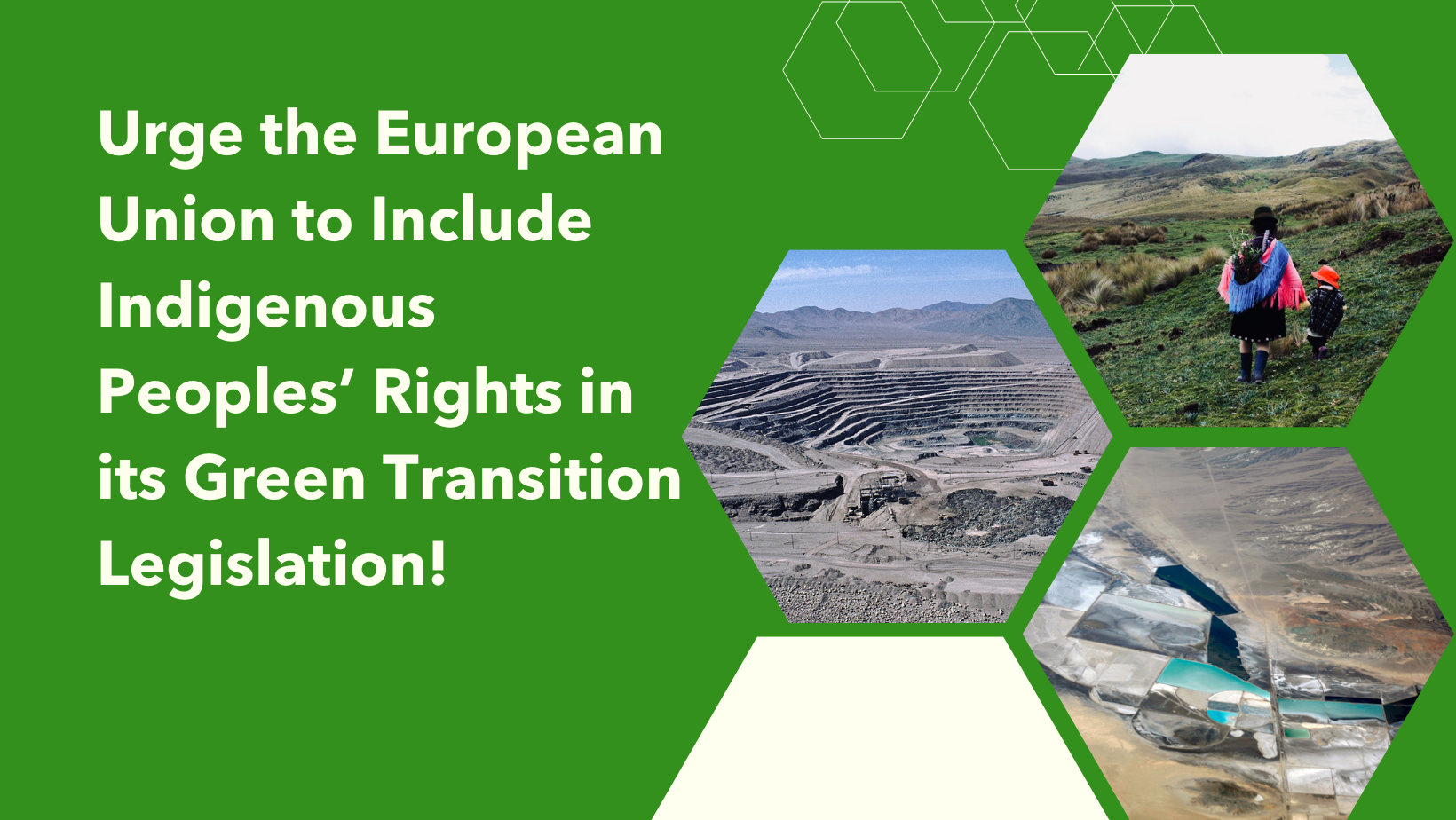
2. Urge the European Union to Include Indigenous Peoples’ Rights in its Green Transition Legislation!
Contact EU legislators and urge them to include references to the UN Declaration on the Rights of Indigenous Peoples, ILO 169, and the right to Free, Prior and Informed Consent (FPIC) in the Corporate Sustainability Due Diligence Directive (CSDDD) and the Critical Raw Materials Act (CRMA).
Learn about the latest developments in the European Union.
- Incorporating Indigenous Peoples' Rights into the European Green Transition - The Gap in Critical Raw Materials Act
- Open Letter to the European Union: The Critical Raw Materials Act Must Ensure Effective Social, Environmental and Governance Safeguards and Provide Meaningful Participation
- A Turning Point: The Critical Raw Materials Act's needs to be truly socially and environmentally just
- Open Letter to President of the European Commission Ursula von der Leyen: Indigenous Peoples Are Key Rights Holders for the Success of the Energy Transition in the EU and Beyond
- SIRGE Coalition Welcomes the European Parliament’s Official Position on the Corporate Sustainability Due Diligence Directive Related to Indigenous Peoples
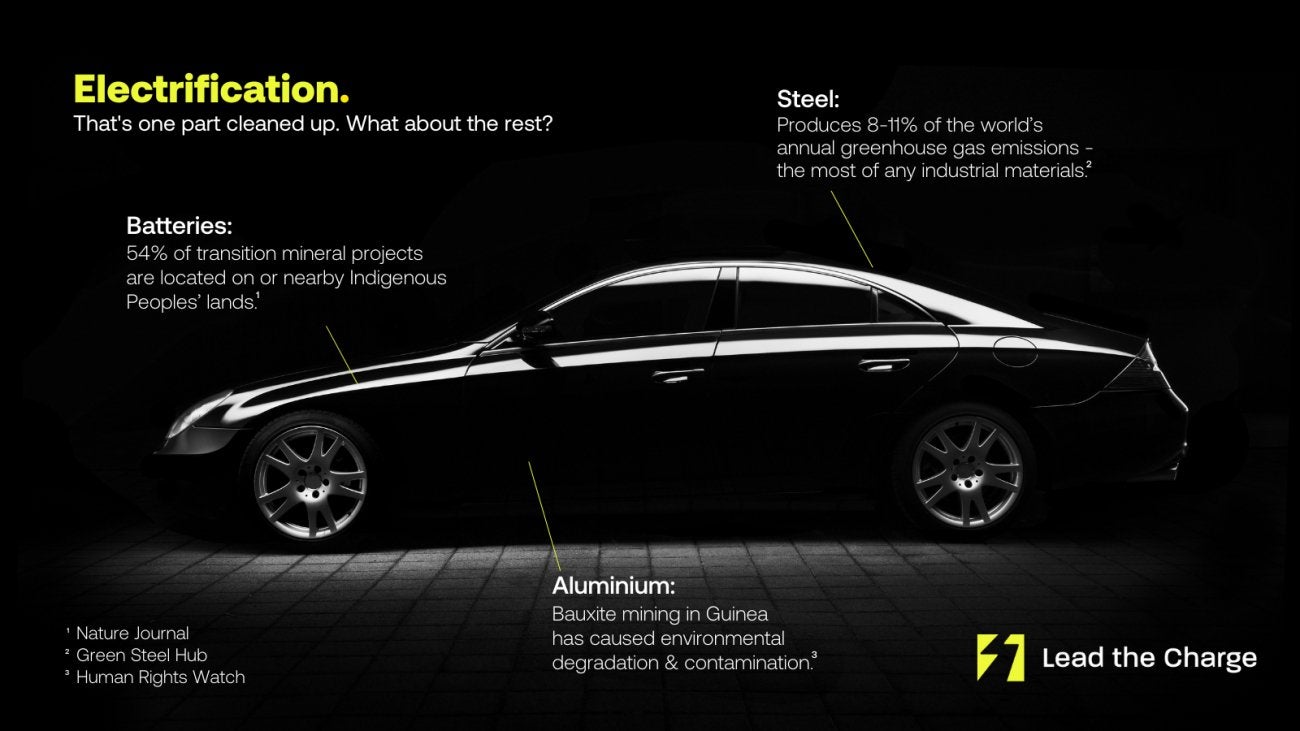
3. Understand the Impacts on Indigenous Peoples from Electric Vehicle Manufacturers!
The global Lead The Charge campaign raises awareness of the human and Indigenous Peoples’ rights, climate, and environmental impacts that occur throughout electric vehicle production.
Their 2023 industry leaderboard analyzed 18 leading manufacturers and found that Indigenous Peoples’ rights were the lowest-scoring category. Two-thirds of automakers scored 0% on Indigenous Rights Risk screening, and to date, no automaker has implemented concrete mechanisms to ensure that commitments to the rights of Indigenous Peoples are realized throughout their supply chain.
RELATED: People of Red Mountain (PRM) has raised significant and urgent concerns regarding human, religious, and Indigenous Peoples rights violations by a proposed lithium mine that impacts the sacred landscape Peehee Mu’huh – Thacker Pass in Nevada. In March 2023, SIRGE Coalition and PRM prepared a letter to General Motors after the automaker invested $650 million into the mine, highlighting the company’s social policies and requesting a meeting on the human rights implications of this investment. To date, the company has not responded.
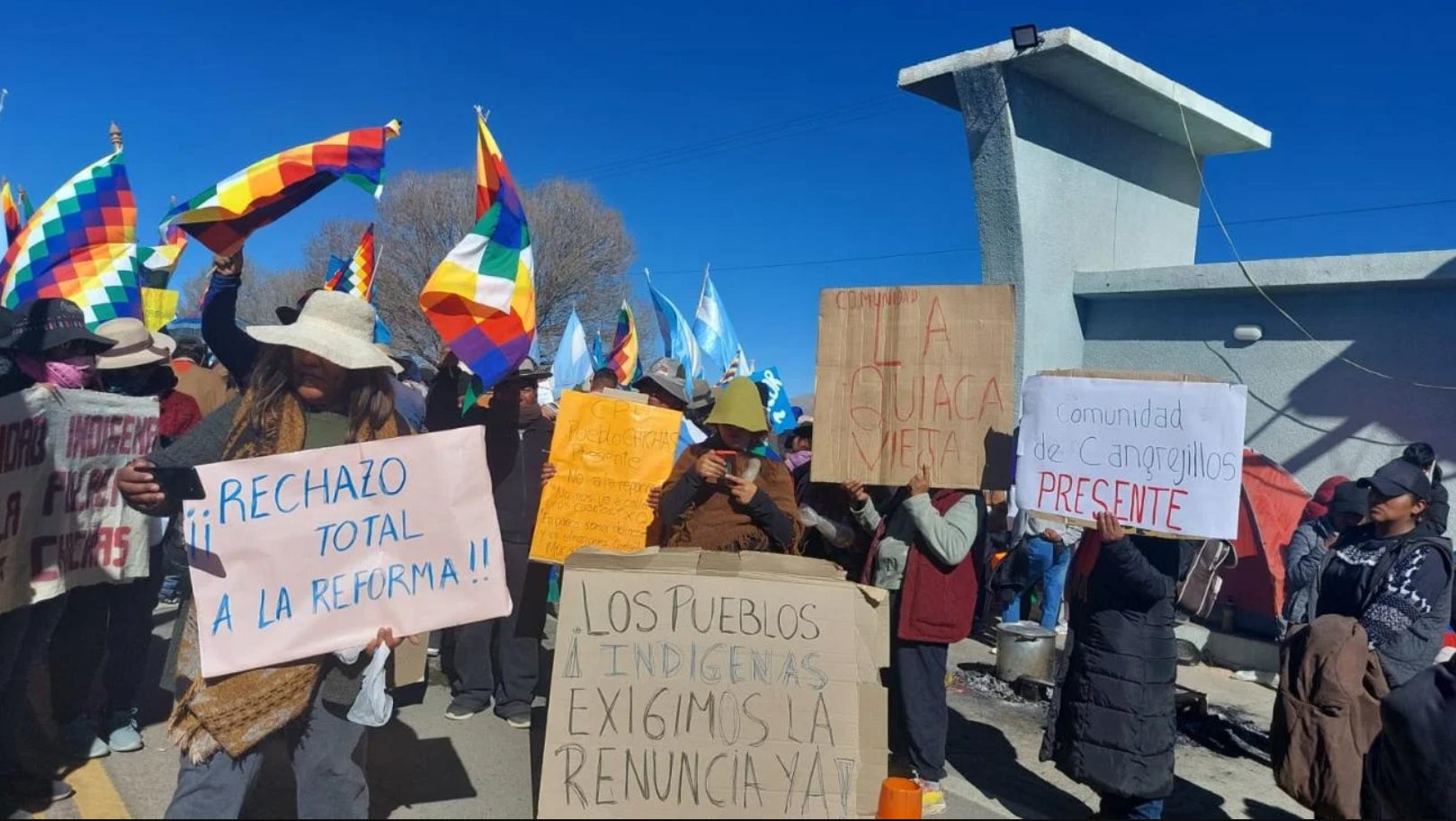
4. Share Stories from Impacted Indigenous Peoples!
Listen to radio programs and podcasts on the impacts of transition mineral mining and the SIRGE Coalition in English, Spanish, Quechua, Nahuatl from Cultural Survival’s Indigenous Rights Radio.
Meet Members of the SIRGE Coalition Steering Committee and learn why this coalition is so important for us all.
- PASANG DOLMA SHERPA (SHERPA), NEPAL, ASIA
- GIDEON SANAGO (MAASAI), TANZANIA, AFRICA
- GALINA ANGAROVA (BURYAT), CHAIR OF EXECUTIVE COMMITTEE:
- HINDOU OUMAROU IBRAHIM (MBORORO), CHAD, AFRICA:
- LESLEY MUÑOZ RIVERA (COLLA), CHILE, CENTRAL, SOUTH AMERICA AND THE CARIBBEAN:
- KATE R. FINN (OSAGE), USA, NORTH AMERICA
- PAVEL SULYANDZIGA (UDEGE), CHAIR OF STEERING COMMITTEE
- RODION SULYANDZIGA (UDEGE), RUSSIAN FAR EAST, EASTERN EUROPE, THE RUSSIAN FEDERATION, CENTRAL ASIA, AND THE CAUCASUS:
Read about how mining for transition minerals is affecting Indigenous communities.
- “From Oak Flat to Spiro: Enduring Indigenous Connections to Copper”
- “The Violent Cartography of Lithium in Brazil: Indigenous and Traditional Communities Struggle with the Giant of Transition Minerals in Brazil”
- "Our Sacred Sites are More Important than a Lithium Mine"
- strong>“Isolated and Impacted by Nickel Mining: Indigenous Communities in Russia Search for Avenues of Justice”
- “When Profit Trumps Rights: The Case of El Estor, Guatemala”
- “‘Green’ Energy is Wiping Out Our Desert Water: The Case of Atacama, Chile”
Learn more about the organizations which launched SIRGE: Cultural Survival, First Peoples Worldwide, Batani Foundation, Earthworks, and the Society for Threatened Peoples.
5. Learn more about International Day of the World's Indigenous Peoples!
The annual International Day of the World's Indigenous Peoples launches with a virtual commemoration on Wednesday, August 9, 9:00-10:30 am ET. This year's theme: Indigenous Youth as Agents of Change for Self-determination. Speakers share their expertise and experience about the role of Indigenous youth in exercising self-determination in the context of climate action and the green transition, mobilizing for justice, and intergenerational connections. Register.
